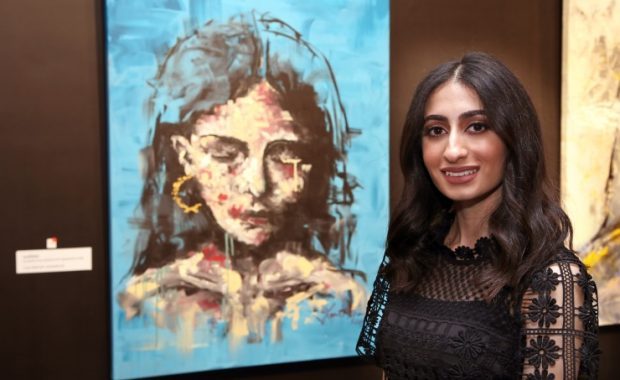Women’s achievements hailed as Bahrain looks forward to further successes

Mirvet Al Thawadi awarded a state recognition of her outstading merits
By Habib Toumi
MANAMA: Intelligent, educated, ambitious and determined to succeed, Bahraini have women tenaciously refused to be like driftwood on the waters of the Gulf and instead decided to energetically paddle towards political, educational, social and economic success.
And on Thursday, amid pride of what has been achieved and what will be accomplished, Bahrain celebrated with great fanfare Bahrain Women’s Day.
The national day has been marked annually on December 1 to pay tribute to women, salute their courage and commitment and hail their progress at every level in the public and private sectors.
Coming in the heels of the parliamentary and municipal elections that saw a record of eight women carrying their constituencies in the 40-member lower chamber of the bicameral parliament, the celebration has a special dimension.
Ten other women were appointed to the upper chamber of the parliament and three women won in the municipal elections.
Days later, five women were appointed as ministers in a cabinet reshuffle.
For decades, Bahrain, the smallest Arab country with an area that is less than 800 square kilometers, has been at the forefront of states advocating the constitutional, political, economic and social rights of women.
Bahrain was the first country to introduce formal school education for girls in 1928, predating the discovery of the first oil well in the region.
Bahrain also had a series of women pioneers who helped with courage and determination charter the way ahead for women even though the country is located in a particularly tough region. Yet, Bahrain has had several women ministers, ambassadors and judges.
Voting rights were on and off since 1936, but the constitution promulgated in 2002 enshrined the rights to both vote and run in parliamentary and municipal elections.
Although the beginnings were a real challenge, the quadrennial polls have gradually turned into landmarks for women’s political success, crowned in November 2022 with the election of eight women.
The theme of Bahraini Women’s Day this year, “I Read, I learned, I participated” offers a comprehensive perspective of the milestones achieved by Bahraini women. It tracks their steady progress from the beginnings.
Bahraini women have always had a pivotal role in the Bahraini society, which increased with the beginning of formal education for girls in 1928, predating the discovery of the first oil well.
Many women pioneers had stretched the limits gradually and this inexorable forward-looking movement continues to build on, and reinforce, past achievements with confident steps.

Displaying her artwork in an exhibition open to a highly discerning public in Bahrain, Layal, a representative of the young women of her generation, oozes self-confidence and beleif in the future
At the top, there was tremendous support to women to fulfill their potential and gain more rights through the constitution and the Supreme Council for Women (SCW), the official entity tasked with elevating the status of women in the country.
The SCW has been overseeing the implementation of women’s political, social, and economic empowerment and advancement policies and promoting the application of the principles of gender equality and opportunity equity.
Its initiatives included the 2013-2022 National Plan for the Advancement of Bahraini Women, which has resulted in achieving results on a nation-wide scale.
An SCW report gauging the progress over the last 10 years found that the percentage of women in the overall working force increased to 43% from 32% in 2012.
The percentage of women in the public sector reached 54% in the second quarter of 2022, with a 7% increase from 2012.
In specialized jobs in the public sector, women make up 59% while 47% of executive positions in the government are held by women.
In the private sector, women are 35% of the working force, an increase of 5% from 2012. In the judicial sector, women are 12%, while 33% of Bahraini diplomats are women.
According to the report, the number of female owners of commercial registrations (CR) increased from 39% in 2012 to 43% in 2021.
The percentage of sustainable ownership of CRs for more than five years, increased for women from 34% in 2014 to 38% in 2021. Also, 53% of virtual CRs are owned by women.
Bahrain ranked third globally in the World Competitiveness Yearbook (WCY) published by International Institute for Management Development (IMD), in its index for the share of women in management positions and share of women with degrees.
The Kingdom ranked among the top 10 countries globally in 56 indicators in different areas, including skills of the labor force, gender equality and safety and social harmony.
In the World Bank’s Women, Business and Law 2022 report, Bahrain’s score improved by 73% between 2018 and 2022. It ranked third on a Gulf scale and fifth in the Arab World.
Meanwhile, Bahrain ranked 131 in the Gender Gap Report issued by the World Economic Forum, with the gap settling at 63%. It scored the highest global ranking in high school and higher education.
Socially, the National Plan for the Advancement of women prioritized overall family stability. It continued to cooperate with the executive, legislative and judicial authorities to provide a safe legal framework for women as part of the family law.
As part of those efforts, Family Courts were moved to separate premises providing more privacy for families during proceedings and counselling.
SCW also launched a national strategy for the protection of women from domestic violence, as part of the national plan.
In 2021, the number of active civil society organizations promoting women’s rights has increased to reach 20.










































